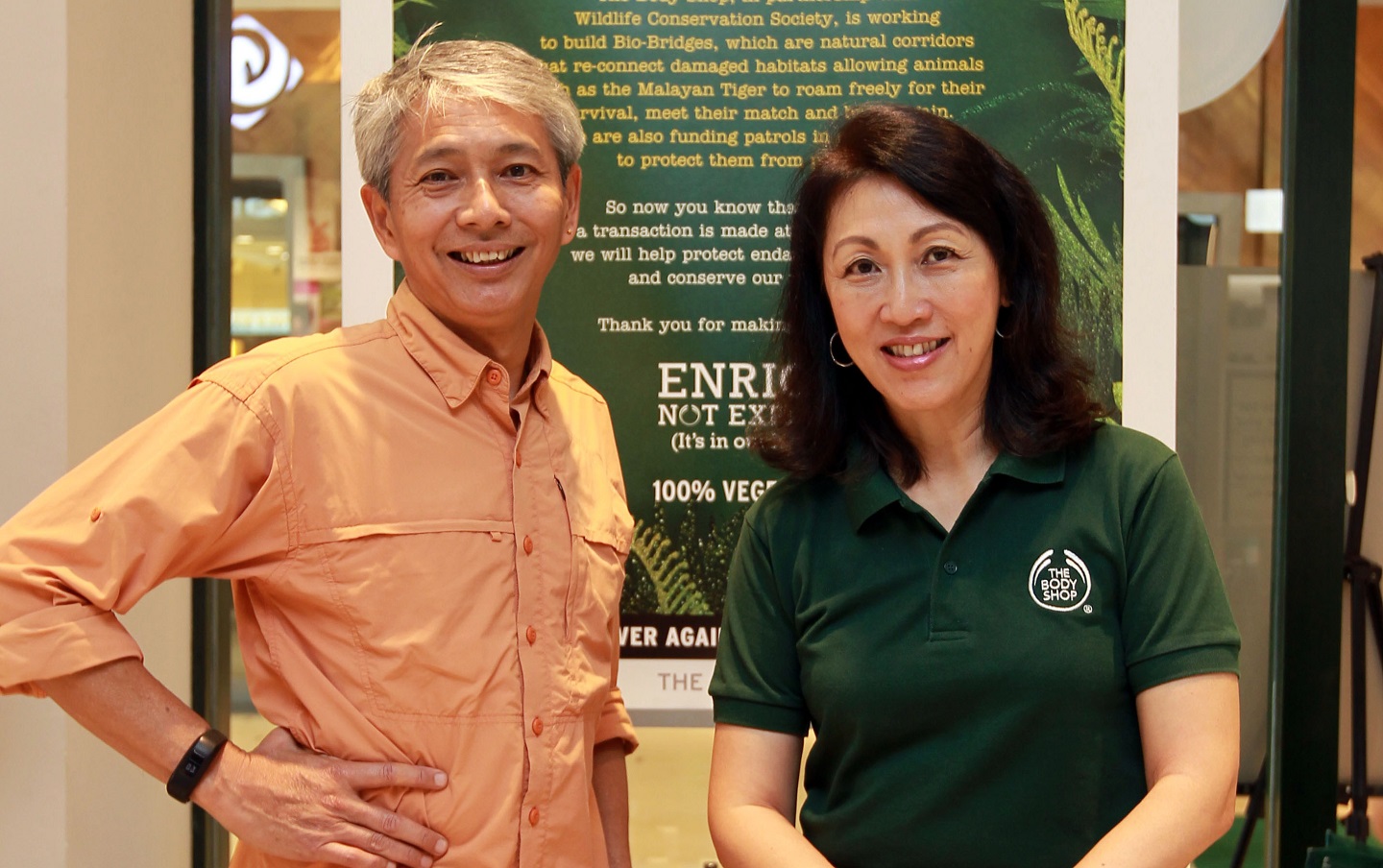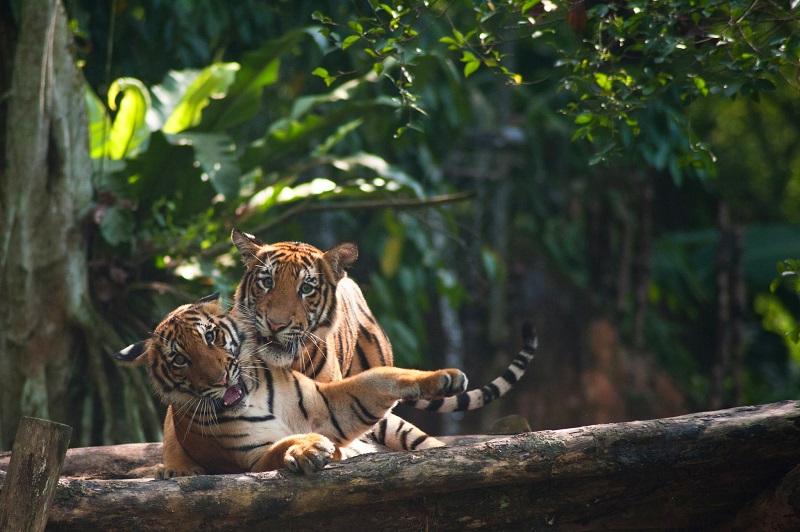
Wildlife Conservation Society's Dr Melvin Gumal and The Body Shop's Datin Mina Cheah (Photo: Shahrin Yahya/The Edge Malaysia)

Although there has been a lot of noise about saving these great cats, not enough has translated into action as numbers have continued to dwindle. The Body Shop Malaysia, whose support of wildlife and the environment has always been part of its identity, has launched a campaign to advocate for an unconventional solution to discourage poaching in our forests — getting the armed forces to help.
Together with WCS and the Malaysian Conservation Alliance for Tigers (MYCAT), The Body Shop Malaysia has launched an online and in-store petition that urges the government to deploy 2,000 army personnel to patrol Peninsular Malaysia’s forests — specifically, Endau Rompin, the Royal Belum-Temenggor Rainforest Complex and Taman Negara — an effort that would drastically reduce poaching.
The number of soldiers that the petition calls for was determined by the team at WCS and at MYCAT, led by Dr Kae Kawanishi. It takes into account factors like geographical area that needs patrolling, the distance one person can safely travel in one day and the concentration of wildlife in the entire area.
“All the tigers we have left in Malaysia can fit into a Boeing 737. That’s it,” Gumal adds wearily. “People do not appreciate or understand that when tiger numbers are too low, you get into very serious issues. For one, if they are not scattered and are allowed to in-breed, you get a very unhealthy bottle-necking of the DNA. This is why they cannot be caged or contained — there are several hundred tigers in captivity in Malaysia, many more globally, but that is not going to help the animals in the wild, nor the species in general.
“Second, is the role of the carnivore, which is to regulate the population. Without carnivores, you will have too many ungulates. They eat young shoots and roots and too many means not enough seeds will survive. A long-term study was done in Tanjong Puting, where a lot of the large cats are no more. As a consequence, you do not get big trees anymore, only smaller ones. At a time when oxygen is already getting scarce, you do not want the forest to shift its form. We need the forests more than ever now because they transform carbon dioxide to oxygen. This is something forests do, not farmland. If we want to save ourselves, we have to look at the entire life cycle.”
As their natural habitat reduces in size, tigers also face the danger of poaching, and this is the specific threat that The Body Shop’s campaign hopes to address. Once the petition obtains 80,000 signatures, it will be submitted to the Ministry of Defence, Ministry of Water, Land and Natural Resources, Ministry of Energy, Science, Technology, Environment and Climate Change and the Attorney-General.
That is not to say that there are no patrols. Gumal says there are about 200 rangers in our forests right now. It is just not enough. “When poaching wasn’t an issue, back in 1990s, it was enough. This little ‘bank’ we had — a few people to ronda once in a while was adequate. But after China opened its doors, everyone started looking to harvest more tiger parts. Remember that little bank? Now, there are robbers waiting. So, what do you do? Put more security guards at the bank! We need to protect this very important natural resource. You do not find our tigers in Fiji, for example, because they are Malayan tigers. They are ours, and only ours.”
The call to our military, instead of asking for help from volunteers, is because of the nature of the jungle — it is not for the untrained to wander around in, and defenceless civilians are no match for armed and often dangerous poachers.
“Have you been into our jungle? The terrain is extremely challenging and normal people cannot expect to wander in by themselves and do anything,” Cheah says. “The jungle is vast — how many kilometres can 200 rangers cover in a day? We need healthy, fit and well-trained people to patrol the jungle. Our petition is asking for 2,000 members of the armed forces to permanently patrol the jungle because we really need the additional boots on the ground to act as a deterrent to poachers. We have an excellent army and we are a nation at peace — we are asking the authorities to deploy these highly qualified men and women to help protect our wildlife.”
Should the authorities sign off on this request, Gumal says that there are standard operating procedures in place to aide the soldiers. And there is no doubt in his mind that this strategy will work. “A while ago, there was talk that certain animals were too hard to save. Granted, biology does not help some animals by making it hard to breed them and, therefore, save them. But tigers are different — they can breed, and they can recover,” he says. “There are places in India and Nepal where numbers dipped badly but rebounded because people decided they were worth saving. We can do this.”
With abundant prey, tigers could come back and breed every two to three years, giving birth to about three cubs at a time. A stable breeding population is also necessary to perpetuate the species; removing any part of the puzzle often means the entire structure falls apart — and this is why poachers need to be eliminated from the picture altogether. Protected areas are important for this reason: wildlife can breed in safe and unthreatened surroundings.
The Body Shop has previously pushed for bio-bridges, linking up forest areas broken up by roads. “The tigers’ habitat becomes larger, safer and more sustainable. This was in 2016, when we thought habitat destruction was a major issue and when tiger numbers were higher. Today, that has taken a back seat because poaching has become a more urgent concern. Because now, even if we connect all the patches of forest, there are no more tigers left to roam,” Cheah says.
Every few years, the idea of commercial breeding crops up as a solution to the declining number of tigers in the wild. “It doesn’t work that way, and this point keeps cropping up because of a bunch of traders who see it as in their best interest,” Gumal says. “Tigers are at the top of the food chain and, if they are not there in the wild, the cycle is severely disrupted. Also, farmed animals cannot be released into the wild. This idea keeps coming up because breeders and people wanting to harvest the animal parts for ‘medicinal’ reasons need an unlimited supply.”
“When you don’t think about it in detail, farming wild animals does seem like a good idea. But it’s a whole life cycle of the animal and the species that you need to think about, and the exploitation that comes with it. Wild animals belong in the wild — it’s that simple,” Cheah says. “There are no shortcuts. That is the crux of our crusade … to save the tigers that we have now because the ones we have in the wild are all we’ve got.”
This article first appeared on June 10, 2019 in The Edge Malaysia.


